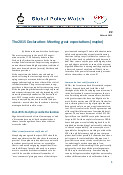Global Policy Watch
Published on Tue, 2015-07-07 13:34
A graphic summary of the state of the negotiations around the post-2015 development agenda in the first days of July, showing where there is consensus and who is behind the different conflicting propositions. Green, Yellow, Red The issues highlighted are arranged in 4 groupings: - Preamble and declaration - Goals and targets - Means of implementation. - Follow-up ad review These groupings mirror the four main sections of the draft UN outcome document for the post-2015 development agenda currently being negotiated by governments at UN headquarters in New York. This summary was compiled by GPW based on national and negotiating group interventions in 3 main clusters.
|
Published on Mon, 2015-06-29 00:00
While negotiations on Financing for Development and the means of implementation of the Sustainable Development Goals (SDGs) within the UN are deadlocked, a new Global Financing Facility (GFF) in support of Every Woman Every Child is going to be established outside of the UN. The creation of the GFF was initiated by the World Bank and the governments of Canada, Norway, and the United States, and announced at the UN General Assembly in September 2014. It will be officially launched in July 2015, at the third Financing for Development Conference in Addis Ababa, Ethiopia.
The GFF is expected to play a key role in financing for reproductive, maternal, newborn, child and adolescent health (RMNCAH) and will serve as a major vehicle for financing the proposed SDG on healthy lives. It is being positioned as the most important new funding mechanism for the SDGs and the Post-2015 Agenda, similar to the Global Fund or GAVI.
|
Published on Fri, 2015-06-12 10:24
The year 2015 –amongst many other things- marks the 20th Anniversary of the UN World Social Summit. The Social Summit brought about the principle of universality as its main outcome determined that that all countries have to pursue the objectives of eradicating poverty, achieving full employment and enabling greater social inclusion simultaneously. The Social Summit generated an extraordinary participation by civil society organizations ranging from development NGOs, women’s organizations, trade unions, social movements and other groups focused on domestic issues. It also inspired the creation of the Social Watch network, report and movement.
|
Published on Tue, 2015-06-02 18:05
Almost one third of the targets that define the 17 Sustainable Development Goals approved by the governments at the UN are being de facto rewritten or deleted by the Inter-Agency Expert Group proposal of “priority indicators” published June 1 in New York. Important notions included in the SDGs such as labour rights, women rights to property, financial services, inheritance and natural resources and many commitments of developed countries to support the efforts of developing countries are excluded from the proposed list of indicators and would therefore not form part of the UN reviews of the new development agenda.
|
Published on Thu, 2015-05-28 09:27
As UN negotiations on the post 2015 framework begin to tackle the complex issues of accountability, review and follow up, the diversity of views, perspectives and the lack of concrete proposals make the likelihood of finding an agreement remote indeed.
|
Published on Wed, 2015-04-29 10:34
It is not surprising that the political battles have already become fierce in the concurrent negotiations for the Third International Conference on Financing for Development (FfD3) and the post-2015 development agenda with its Sustainable Development Goals (SDGs). At stake is who will shape the agenda—and how much real impact it will have.
What is the direction of the “transformation” that is now so frequently discussed in both talks? Are we headed towards a world of multistakeholder partnerships and the increasing outsourcing of public functions to private control, where those in positions of privilege can maintain their entitlements, at least until we fully breach planetary boundaries?
Or towards a world where we make decisions based foremost on the welfare of the majority of people and the planet?
|
Published on Wed, 2015-04-22 12:30
The outcome of the Third International Conference on Financing for Development (FfD3) will affect the ability of states to fulfill their human rights obligations, and achieve the Sustainable Development Goals (SDGs) and targets being set for the post-2015 agenda. Both human rights and the SDGs are similar in that they are universal, and entail individual as well as common responsibilities, taking into account varying national capacities to achieve them.
The SDGs take three different forms: those of particular relevance to the internal affairs of all countries, including rich ones, requiring changes in their domestic policies; those that address the need to change domestic policies in order to reduce negative external effects beyond a country’s borders; and those that zero in on international duties and responsibilities. The last two mainly apply to wealthier countries.
|
Published on Fri, 2015-04-17 09:52
Getting the right balance between public and private sector roles and responsibilities in the Financing for Development and Post-2015 process will be fundamental to prospects for sustainable, inclusive development. Yet early evidence suggests this balance is already awry, skewed far in favour of private interests. Are we seeing a process of outsourcing the international agenda?
There’s no question that businesses around the world are sources of growth and employment. But they are also the source of the most serious threats to sustainable development—from pollution to illicit financial flows that undermine prospects for public resources.
Can we have a transformative development agenda without the transformation of business?
|
Published on Tue, 2015-04-07 09:44
The post-2015 development agenda aspires to global transformation. Its content so far, including the set of 17 sustainable development goals (SDGs) agreed in last year’s Open Working Group, affirms that aim through an unprecedented commitment to inclusion, sustainability and universality. This suggests that the world might finally move beyond current imbalanced patterns of consumption and production that have left wide swathes of human deprivation and pushed the limits of planetary boundaries. Yet the main question, after the most recent intergovernmental negotiations on the agenda in March in New York, is: will the political process live up to the agenda’s promise?
|
Published on Sat, 2015-03-21 20:30
The 23-27 March session of the Post-2015 intergovernmental negotiations will focus on the Sustainable Development Goals and Targets. The choice of indicators for the SDGs is a major policy decision with long-term consequences -- nationally and globally. This has sparked ongoing discussion over whether the indicators should be technical or politically negotiated (or a combination).
|
SUSCRIBE TO OUR NEWSLETTER
Submit

|








